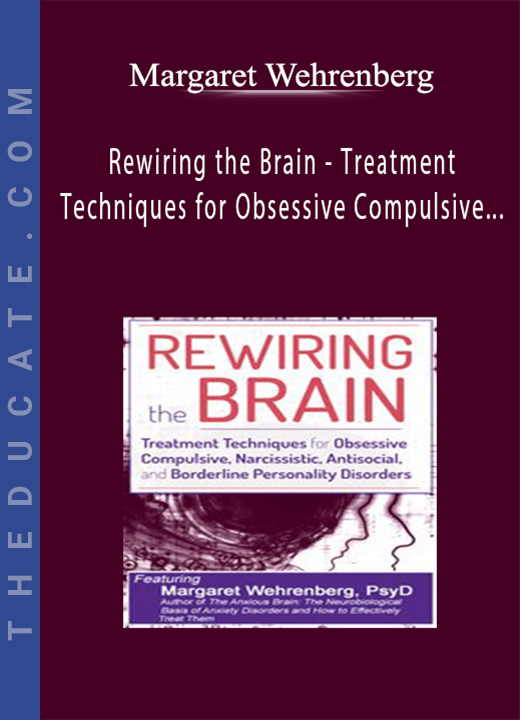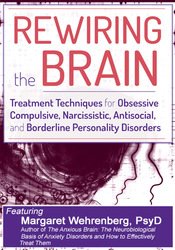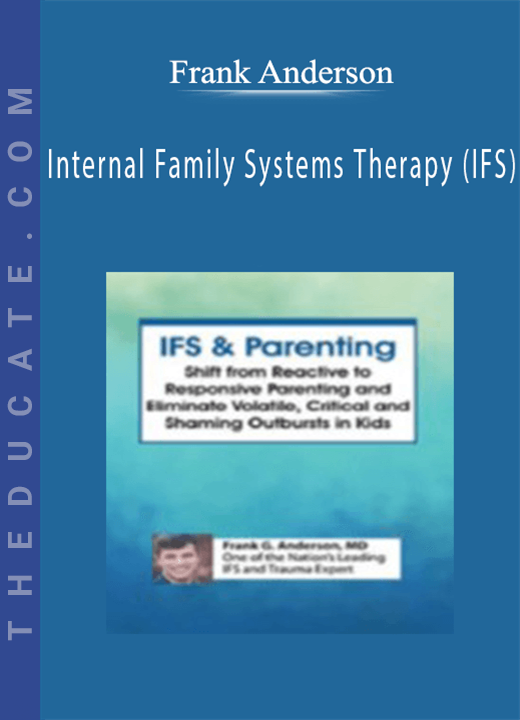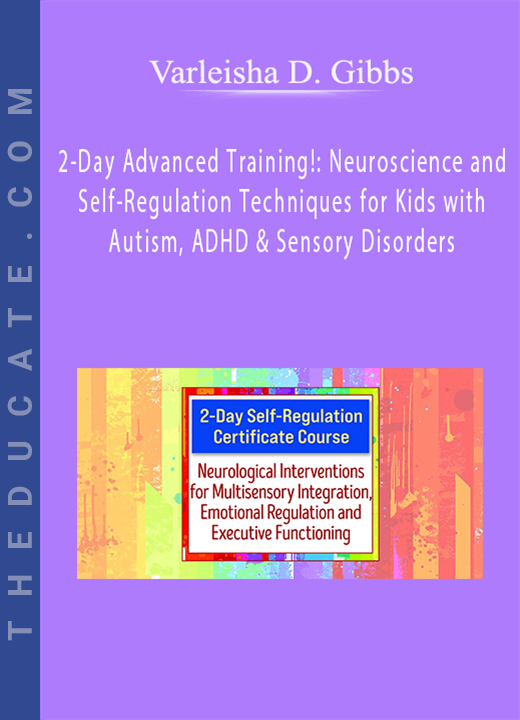Description
Margaret Wehrenberg – Rewiring the Brain: Treatment Techniques for Obsessive Compulsive, Narcissistic, Antisocial, and Borderline Personality Disorders
- Faculty:
- Margaret Wehrenberg
- Duration:
- Full Day
- Format:
- Audio and Video
- Copyright:
- May 06, 2016
Description
Imagine your sessions with clients with personality disorders. What comes to mind? Challenging? Overwhelming? Frustrating?
What if you had the tools to make each session feel more productive and that you’re actually making progress?
Discover how you can help your client become:
- More emotionally stable
- More empathetic
- More flexible in the way he/she thinks and reacts in trying situations
- Less reactive
All this is possible once you have developed the skills to help your client modify the rigid, maladaptive traits of obsessive compulsive, narcissistic, antisocial, and borderline personality disorders. You can learn how to utilize the motivations and defenses of these disorders to create lasting improvement.
Join international speaker and author Margaret Wehrenberg, PsyD, as she teaches you practical treatment techniques grounded in cutting-edge neuroscience. Using techniques from DBT, Mindfulness, CBT and EMDR, your clients can learn to rewire their brain to live a healthier, more stable and productive life.
Handouts
| Webcast Manual (0.99 MB) | 40 Pages | Available after Purchase |
Outline
PART I: THE DEVELOPMENT OF PERSONALITY DISORDERS
- Biology and temperament
- Agency and a desire to be affiliated
- Anxiety and harm avoidance
- Interpersonal Neurobiology – The concept of neural repair and neural integration
PART II: TREATMENT STRATEGIES
I. Antisocial Personality Disorder
- Anxiety and APD
- Develop harm avoidance
- Utilize active relaxation
- Anxiety in disguise: Find anxiety and tame
- Anger with the anger diary
- Anger escalator tools for anger management
- Depression and the Antisocial PD
- The hidden emotion
- Cost-benefit analysis of behaviors
- Use HALT tips to modulate expression
- Interpersonal Relationships and APD
- Turn agency into positive paths
- Journaling to identify implicit memory to increase awareness
- Train the “wise mind” for better self-control
- Storytelling for attunement and empathy
II. Narcissistic Personality Disorder
- Anxiety and NPD
- Diminish the intensity of harm avoidance
- Teach appropriate assertiveness
- Worry management strategies
- Energy therapies and self-soothing
- Dispute irrational fears of humiliation
- Resolve childhood humiliation
- Depression and NPD
- Increase agency
- Accept responsibility for vicious circles of grandiosity and loss
- Battle grandiosity by increasing achievement
- Improving awareness of and attunement to others
- Mindfulness techniques and cost-benefit analysis
- Interpersonal Relationships and NPD
- Using desire for affiliation
- Reframe indifference to others and motivate connection with dialectical constructs
- Genuine contributions: The path to legitimate self-worth
III. Obsessive-Compulsive Personality Disorder
- Anxiety and OCPD
- Breaking the rule of harm avoidance
- Identify the conflict with inner values
- CBT to change worry and rumination
- Real self- focusing techniques to find feelings
- Discharging anger – the underlying trigger of anxiety
- Learning to tolerate anxiety of making mistakes
- Breaking free from “technology slavery”
- Depression and OCPD
- Increase positive agency
- Change derogatory self-talk
- Interrupt and dispute compulsive behavior
- Prescribe fun!
- Interpersonal relationships and OCPD
- Affiliation and anger
- Mindfulness practices to increase attunement to others
- “I” statements and negotiation skills:
- Deflate resistance to increase self/other honesty
- Systems therapy strategies
- Eliminate passive aggression
IV. Borderline Personality Disorder: The Quest for Connection
- Anxiety and BPD
- The forgetfulness of harm avoidance
- Fill in skills deficits: Teach and practice conflict resolution skills
- G round techniques to increase emotional stability
- Journaling techniques
- Depression and the BPD
- The forgetfulness of agency
- Interrupt self-injurious behavior
- EMDR practices to loosen the grip of the past
- Minimize catastrophic rumination w/CBT
- Interpersonal Relationships
- Craving affiliation and its destructive impact
- Improve therapeutic relationships
- Relationship histories
- Practice assertiveness vs aggression
Please Note: PESI is not affiliated or associated with Marsha M. Linehan, PhD, ABPP, or her organizations.
Faculty

Margaret Wehrenberg, Psy.D. Related seminars and products: 15
Psychologist
Wehrenberg and Associates
Margaret Wehrenberg, Psy.D., a licensed clinical psychologist, is the author of nine books on the treatment of anxiety and depression, including her most recent e-book, Pandemic Anxiety: Fear, Stress, and Loss in Traumatic Times (January, 2021), best selling book, The 10 Best-Ever Anxiety Management Techniques (W.W. Norton, 2018), and You Can Handle It: 10 Steps to Shift Stress from Problem to Possibility (PESI, 2017). She has also written a book for the general public, The 10 Best Anxiety Busters.
An expert on the treatment of anxiety and depression, she also has extensive training and expertise in the neurobiology of psychological disorders. In addition to clinical work, she coaches business professionals on managing anxiety and has contributed articles for the Psychotherapy Networker magazine. She has produced Relaxation for Tension and Worry, audio soundtracks for breathing, muscle relaxation and imagery to use with anxious clients. Margaret blogs on depression for Psychology Today. Noted for humor, pragmatic treatment approaches, and her interactive teaching style, Dr. Wehrenberg is a sought-after speaker for conferences and trainings, consistently getting the highest ratings for her dynamic presentation and high-quality content. She is one of PESI’s most highly rated speakers and her evaluation from the most seasoned professionals often rank her training “as among the best I have ever attended.”
Speaker Disclosures:
Financial: Margaret Wehrenberg maintains a private practice. She is an author with W.W. Norton publishing and receives royalties. She receives a speaking honorarium from PESI, Inc.
Non-financial: Margaret Wehrenberg is a member of the American Psychological Association and the Anxiety Disorder Association of America.









12 reviews for Margaret Wehrenberg – Rewiring the Brain – Treatment Techniques for Obsessive Compulsive, Narcissistic, Antisocial, and Borderline Personality Disorders
There are no reviews yet.